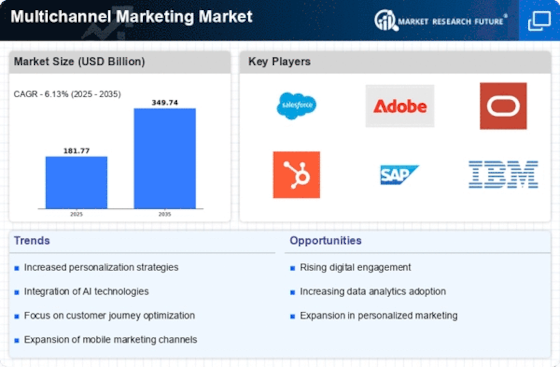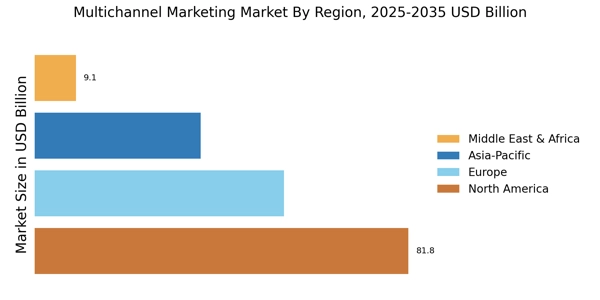Expansion of E-commerce and Online Shopping
The expansion of e-commerce and online shopping is a significant driver in the Multichannel Marketing Market. As more consumers turn to online platforms for their shopping needs, businesses are compelled to adopt multichannel marketing strategies to capture this growing audience. Recent reports indicate that e-commerce sales are expected to reach $6 trillion by 2024, highlighting the urgency for brands to establish a robust online presence. This trend not only influences marketing tactics but also necessitates the integration of various channels to provide a cohesive shopping experience. Consequently, the rise of e-commerce is reshaping the landscape of the Multichannel Marketing Market.
Rising Consumer Expectations for Engagement
In the Multichannel Marketing Market, rising consumer expectations are reshaping marketing strategies. Today's consumers demand seamless interactions across multiple platforms, including social media, email, and mobile applications. This shift necessitates that businesses adopt a multichannel approach to meet these expectations. Data suggests that 70% of consumers prefer personalized communication, which compels marketers to refine their strategies accordingly. As a result, companies are investing heavily in multichannel marketing solutions to enhance customer engagement and satisfaction. This trend indicates a growing recognition of the importance of meeting consumer demands in the Multichannel Marketing Market.
Technological Advancements in Marketing Tools
The Multichannel Marketing Market is experiencing a surge in technological advancements that enhance marketing strategies. Innovations such as artificial intelligence, machine learning, and data analytics are transforming how businesses engage with customers across various channels. For instance, AI-driven tools enable marketers to analyze consumer behavior in real-time, allowing for more targeted campaigns. According to recent data, the adoption of advanced marketing technologies is projected to increase by 25% over the next five years, indicating a robust growth trajectory. This technological evolution not only streamlines marketing processes but also improves customer experience, making it a pivotal driver in the Multichannel Marketing Market.
Increased Focus on Data-Driven Decision Making
The Multichannel Marketing Market is increasingly driven by a focus on data-driven decision making. Businesses are leveraging vast amounts of consumer data to inform their marketing strategies, ensuring that campaigns are not only effective but also measurable. The ability to track customer interactions across various channels allows marketers to optimize their efforts in real-time. Recent statistics reveal that companies utilizing data analytics in their marketing strategies see a 20% increase in ROI compared to those that do not. This emphasis on data is likely to continue shaping the Multichannel Marketing Market as organizations strive for greater efficiency and effectiveness.
Growing Importance of Customer Retention Strategies
In the Multichannel Marketing Market, the growing importance of customer retention strategies is becoming increasingly evident. Businesses recognize that retaining existing customers is often more cost-effective than acquiring new ones. As a result, there is a heightened focus on developing loyalty programs and personalized marketing efforts aimed at existing customers. Data indicates that increasing customer retention rates by just 5% can lead to a profit increase of 25% to 95%. This realization is driving companies to invest in multichannel marketing solutions that foster long-term relationships with customers, thereby enhancing their competitive edge in the Multichannel Marketing Market.

















